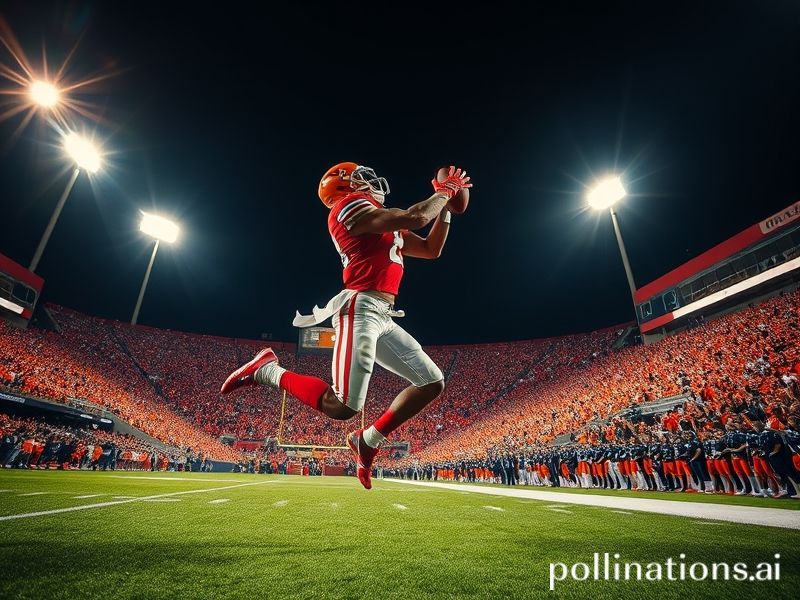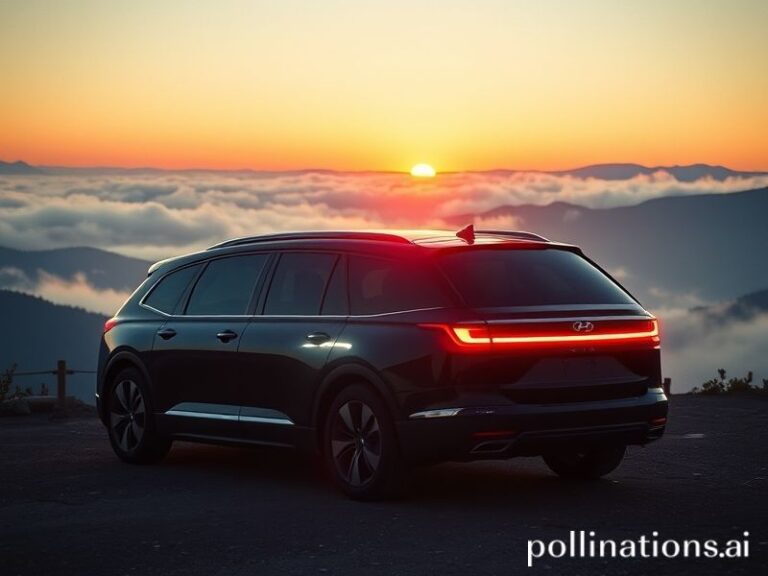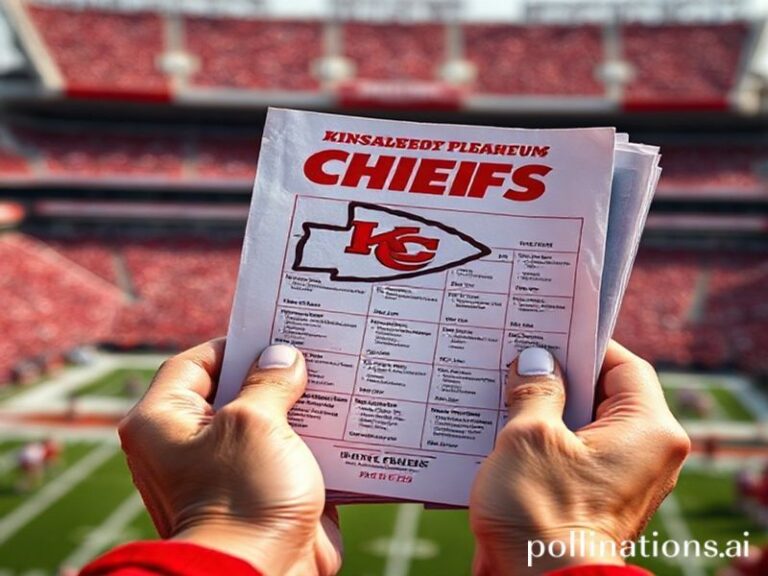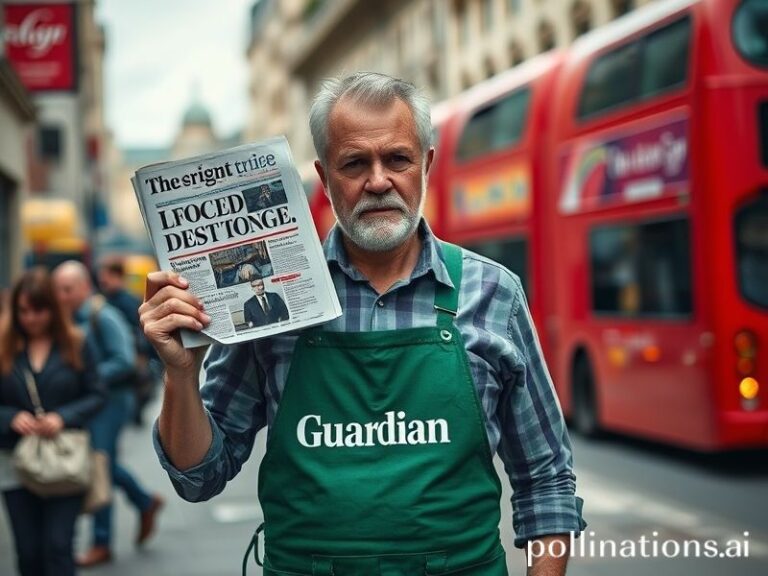Tulsa vs Oklahoma State: The Prairie Derby That Explains America to the Rest of the World
TULSA v. OKLAHOMA STATE: How One Dust-Bowl Derby Quietly Explains the End of the American Empire
From the vantage point of a café terrace in Lisbon, where the espresso is strong and national decline is just another menu item, the annual collision between the University of Tulsa and Oklahoma State resembles a morality play staged with subsidised corn syrup and LED lights. Two schools, separated by 70 miles of wind-parched prairie and exactly one socioeconomic class, meet on the gridiron to decide nothing and yet say everything about the republic that bankrolls them.
To the uninitiated foreign eye, the fixture looks like a modest regional squabble—roughly the geopolitical weight of Liechtenstein invading Andorra with pool noodles. But zoom out: this is the same country that currently owes the world 34 trillion dollars, keeps 750 military bases on other nations’ lawns, and still finds time to argue about which brand of agricultural college produces the better third-string quarterback. If that isn’t imperial late-stage burlesque, what is?
Tulsa, the private liberal-arts outpost, markets itself as “Harvard on the Arkansas,” a phrase that causes actual Harvard to choke discreetly on its endowment. Oklahoma State, meanwhile, is a land-grant behemoth whose campus features a literal oil derrick, as if someone asked, “How can we make higher education feel more like a BP shareholder meeting?” Between them, they capture America’s bipolar soul: boutique meritocracy versus fossil-fuel populism, each convinced the other is the villain in a Netflix docuseries yet to be green-lit.
Internationally, the game is broadcast on a niche sports channel sandwiched between Filipino cockfighting and German tractor-pull reruns. Ratings are modest, but the feed still reaches U.S. forward-operating bases in Djibouti, where homesick logistics officers gamble MRE desserts on the over/under. Thus, in a roundabout way, the outcome influences morale in the Horn of Africa, which influences drone-maintenance schedules, which influences who gets vaporised by accident this week—a butterfly effect born on the 40-yard line.
On the field, the strategic plot is familiar: Tulsa’s defense (nicknamed “The Golden Tornado,” because nothing says safety like lethal weather) attempts to corral Oklahoma State’s offense, which operates at the speed of an Amazon warehouse during Prime Day. The Cowboys’ coach is a man who looks like he sleeps in a tanning bed and dreams in play-action passes; Tulsa’s is younger, paler, and visibly calculating how quickly he can parlay moral victories into a Power-Five gig before the program’s budget is devoured by Title IX lawyers.
Economists watching from Frankfurt note the game’s indirect stimulus: $20 million in ticket sales, $4 million in beer and nacho futures, plus untold sums in orthopedic surgeries that will eventually be socialized across America’s broken health-care system. It’s trickle-down Keynesianism, if the trickle is mostly cholesterol.
And then there are the geopolitical metaphors—impossible to ignore, like a marching band doing Stravinsky. Tulsa, smaller and craftier, represents the old diplomatic corps: outgunned, underfunded, but still convinced nuance can win the day. Oklahoma State is the Pentagon: larger, louder, and equipped with a marching band whose tubas could serve as field artillery. When the final whistle blows, the scoreboard declares a victor, yet both sides retreat to the same crumbling republic, united only in shared debt and ambient dread.
So why should anyone in Jakarta or Johannesburg care? Because the spectacle is a live feed of a superpower arguing with itself while the credit-card bill smolders. The rest of the planet long ago learned to game America’s distracted decadence; watching Tulsa and Oklahoma State is like watching a diabetic order a second funnel cake—sympathy mixed with lucrative anticipation.
In the fourth quarter, with Tulsa driving but down by ten, a thunderstorm rolls across the prairie, the kind that once bankrupted farmers and now merely delays kickoff. Play resumes under synthetic lightning, because television windows are sacred and climate change is merely a ratings rival. Tulsa scores; Oklahoma State answers 43 seconds later. The final margin is seven—close enough to sustain delusions, wide enough to change nothing.
As the fans disperse into the humid night, the stadium lights dim against a horizon dotted with oil rigs blinking like low-orbit satellites. Somewhere in Brussels, an EU trade negotiator jots a note: “Americans still funding circuses.” Somewhere in Tulsa, a sophomore linebacker updates his NIL profile. And somewhere in the Indian Ocean, a drone pilot toggles back to the live feed, comforted by the familiar sight of two small American tribes still pretending outcomes matter.







